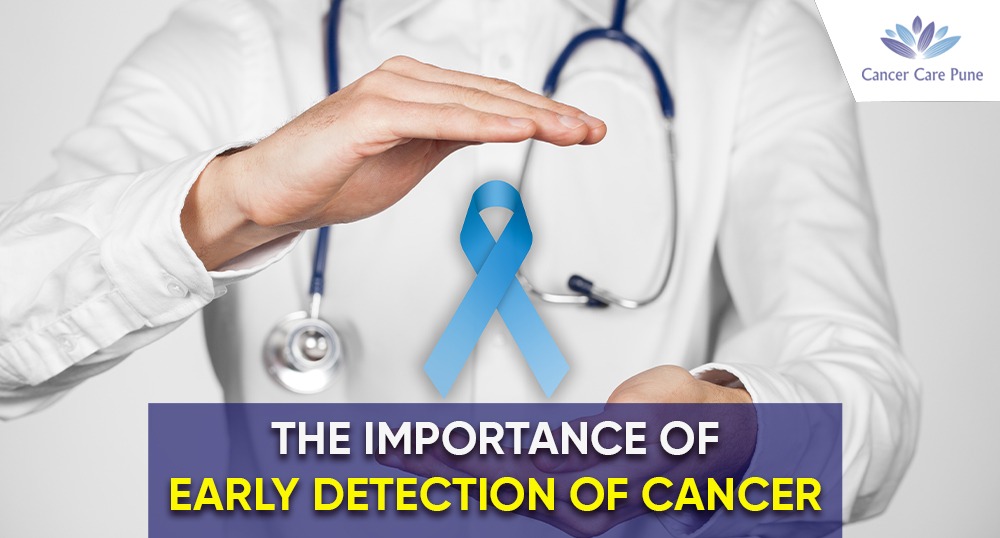
Cancer is a complex disease that can affect people of all ages, genders, and backgrounds. The disease occurs when abnormal cells in the body start growing and multiplying uncontrollably, invading surrounding tissues and organs. Over time, cancer can spread to other parts of the body and become more difficult to treat. Early detection of cancer is crucial to improving the chances of successful treatment and survival. In this blog, we will discuss the importance of early detection of cancer and the various screening methods available.
Why Early Detection is Important:
Early detection of cancer is critical to improving treatment outcomes and increasing the chances of survival. When cancer is detected early, it is more likely to be localized and easier to treat. Early treatment can also help prevent cancer from spreading to other body parts. In some cases, early detection can even lead to a complete cure.
On the other hand, when cancer is detected at a later stage, it is often more advanced and has spread to other parts of the body, making it more difficult to treat. Late-stage cancer is associated with a higher risk of complications and a lower chance of survival. For this reason, detecting cancer as early as possible is essential to give the best chance of successful treatment.
- Screening Methods for Cancer Detection:
There are several screening methods available for the early detection of cancer. These methods can help detect cancer in people who have no symptoms and are at high risk of developing the disease. The most commonly used cancer screening methods include:
- Mammography: Mammography is a type of X-ray that is used to screen for breast cancer. This screening method is recommended for women over the age of 50, and those with a family history of breast cancer. Regular mammograms can detect breast cancer early, making it easier to treat.
- Pap test: A Pap test is a screening test that is used to detect cervical cancer. The test involves taking a sample of cells from the cervix and examining them under a microscope. The Pap test is recommended for women between the ages of 21 and 65, and those who are sexually active.
- Colonoscopy: Colonoscopy is a screening test that is used to detect colorectal cancer. The test involves examining the colon and rectum with a long, flexible tube called a colonoscope. The American Cancer Society recommends that people at average risk of colorectal cancer start screening at age 45.
- Prostate-specific antigen (PSA) test: The PSA test is a blood test that is used to screen for prostate cancer. The test measures the level of PSA, a protein produced by the prostate gland. Elevated levels of PSA may indicate the presence of prostate cancer. The American Cancer Society recommends that men discuss the benefits and risks of PSA testing with their doctor starting at age 50.
- Skin examination: Skin examination is a screening method that is used to detect skin cancer. The examination involves checking the skin for unusual moles or other changes that may indicate skin cancer. People who are at high risk of skin cancer, such as those with fair skin or a family history of the disease, should have regular skin examinations.
- Lung cancer screening: Lung cancer screening is a type of CT scan that is used to detect lung cancer. The test is recommended for people who are at high risk of developing lung cancer, such as current or former smokers. The American Cancer Society recommends that people at high risk of lung cancer discuss screening options with their doctor.
- Benefits and Limitations of Cancer Screening:
While cancer screening can be a valuable tool for detecting cancer early, it is important to understand the benefits and limitations of each screening method. Some of the benefits of cancer screening include:
- Early detection of cancer: Cancer screening can help detect cancer at an early stage, making it easier to treat and increasing the chances of survival.
- Reduced risk of complications: Early detection of cancer can help reduce the risk of complications associated with more advanced stages of the disease.
- Improved quality of life: Early detection and treatment of cancer can improve the quality of life for cancer patients and their families.
However, there are also limitations to cancer screening methods that should be considered:
- False-positive results: Cancer screening tests can produce false-positive results, which means that the test indicates the presence of cancer when there is none. This can lead to unnecessary follow-up tests and anxiety.
- False-negative results: Cancer screening tests can also produce false-negative results, which means that the test does not detect cancer when it is present. This can lead to a delay in diagnosis and treatment.
- Overdiagnosis: Some cancer screening tests can detect cancers that would never cause harm or require treatment, leading to overdiagnosis and overtreatment.
- Cost: Cancer screening tests can be expensive, and some insurance plans may not cover the cost of screening tests.
- Overall, the benefits of cancer screening outweigh the limitations, but it is important to discuss the benefits and limitations of each screening method with your doctor to determine the most appropriate screening strategy for you.
Conclusion:
Early detection of cancer is crucial to improving treatment outcomes and increasing the chances of survival. Several screening methods are available for the early detection of cancer, including mammography, Pap test, colonoscopy, PSA test, skin examination, and lung cancer screening. While cancer screening can be a valuable tool for detecting cancer early, it is important to understand the benefits and limitations of each screening method. It is recommended that people discuss the benefits and risks of cancer screening with their doctor to determine the most appropriate screening strategy for their individual needs. Remember, early detection can save lives, so don’t delay getting screened for cancer.




